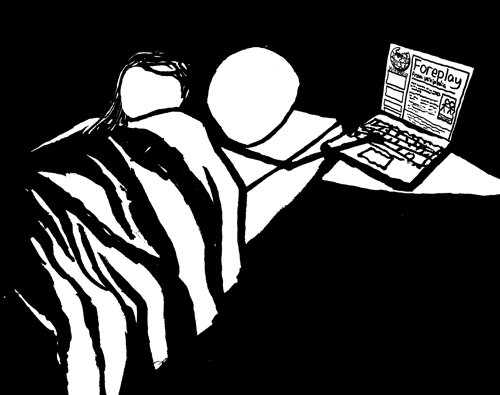Archive for the ‘ignorance’ tag
Wikipedia and the Death of Ignorance
So. Six weeks away from the office, as semester gives way to exams and to the Christmas break. It’s been a mental semester, but one I’ve really enjoyed.
 Anyway. I happened to make it to the LecturesIreland Jimmy Wales talk last Friday night in Trinity College, where I watched the founder of Wikipedia discuss his vision of the availability of human knowledge, and got to ask him whether a print version of the world’s biggest encyclopedia is a grim inevitability given the site’s goal of sharing all the world’s knowledge with all the world’s people, and the relatively sparse level of internet penetration in the wider world. (The answer to that long-winded sentence, which I managed to deliver in person with the same breathlessness as I typed it, was ‘yes’.)
Anyway. I happened to make it to the LecturesIreland Jimmy Wales talk last Friday night in Trinity College, where I watched the founder of Wikipedia discuss his vision of the availability of human knowledge, and got to ask him whether a print version of the world’s biggest encyclopedia is a grim inevitability given the site’s goal of sharing all the world’s knowledge with all the world’s people, and the relatively sparse level of internet penetration in the wider world. (The answer to that long-winded sentence, which I managed to deliver in person with the same breathlessness as I typed it, was ‘yes’.)
Simultaneously, being a man of leisure before I start some work experience next week, I’ve been on an XKCD binge for the last few days, putting the ‘Random’ link on my bookmarks toolbar and clicking it ad nauseum for hours, disturbing the housemates with sporadic giggling.
I should mention, at this point, that since I set up this WordPress installation nearly a year ago and did a word dump of some potential posts into the Drafts folder, this piece has been sitting near the top, awaiting its turn to be fleshed out to the requisite few hundred words, but held back by (i) my sheer ineptitude at blogging with any regularity and (ii) a treadmill of college-study-college-finals-two-jobs eating almost all of my time.
So – I’m stumbling through XKCD and this one shows up:

It’s called Getting Out of Hand – and to a large extent, ‘out of hand’ is how I think our use of Wikipedia is slowly becoming.
I’ll begin with this: I adore education, purely for education’s own sake, and Wikipedia is, in my eyes, the best resource on the planet. Of any sort. It’s astounding. It’s the perfect companion to the modern ubiquity of tabbed browsing; open any page, and if there’s another piece you want to look at, you don’t have to cut short your initial reading – you merely queue it up in the background. I’ve misspent countless hours accidentally tumbling through election results and the minutae of international soccer tournaments. Spending a few hours on Wikipedia is like going on a druggy bender, where curiosity is the drug and the hangover is a cocktail of ‘Aaaah!’ and ‘Is that the time?’.
Another great thing about the Firefox and Wikipedia marriage is the ability to add search keywords. My browsers are customised so that if I go to the address bar and type ‘wp Adolf Hitler’ (where ‘wp’ stands for Wikipedia), the Adolf Hitler entry loads in seconds. It’s a fantastic ability, but one that leads to an easily developed over-reliance.
Put very simple, Wikipedia has slowly become far too easy to rely upon. When broadband first standard gaining prominence in the early part of this decade, the ability to access an untapped well of knowledge. As we go mobile, and slowly mesh ourselves into an interconnected web of data, the sum of all human knowledge is available pretty much everywhere (note Patrick Collison’s Encyclopedia app for the iPhone, which allows users to download the entirety of Wikipedia for seven quid). If you’re struggling to remember even something as insignificant as Roy Keane’s middle name on the move, it’s not difficult to get hold of the data – especially now as people slowly become more au fait with their phones’ abilities to access mobile websites.
I once asked an old German teacher, quite lazily, what the translation of some inane noun was, and was given an educating response. She told me that if I were just to listen to her translate it and write it down, I was unlikely to retain any of that information; but if I were to take a few minutes and check it in the dictionary myself, I was far more likely to retain the fact. (It was ‘potatoes’, and the translation – which, indeed, has never left my mind since, is ‘Kartoffeln’). But what is it to lose the wonder of not knowing things? Wikipedia might give the ideal process of a quest to check information, but when it becomes as instant as a teacher’s responses, it loses that special edge that genuine, laboured curiosity brings.
We’re coming dangerously close to a time where necessity – being the mother of invention – is a non-entity. If every enquiry can be answered in nanoseconds, what will become of human imagination? Ignorance is the fuel that drives humans to be more creative and do exceptional things. If all answers can be gotten at a moment’s notice, we forever lose grasp of that drive to create better things.
Roy Keane’s middle name, by the way, is Maurice. No Wikipedia needed.